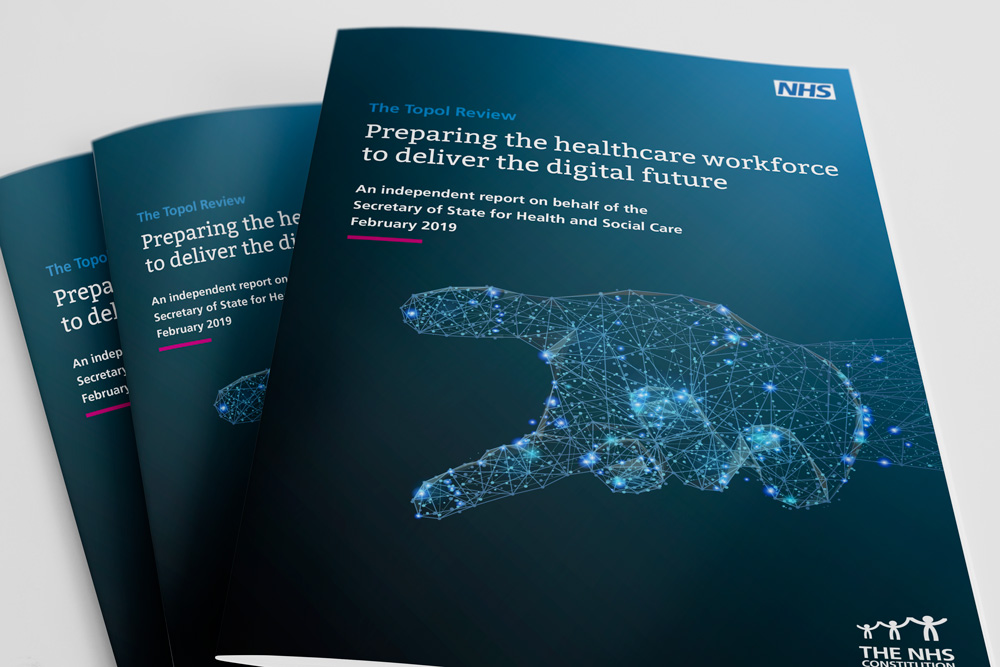The long-awaited Topol Review of how technology will impact on the NHS workforce has been published. It ranges over topics as diverse as the ethics of data analysis and the nature of intelligence. Which may or may not have been what ministers and planners were hoping for. Lyn Whitfield reports.
Who is Dr Eric Topol?
Wikipedia describes him as a “cardiologist, geneticist and digital medicine researcher” before getting into the details of a long and complex medical career. He came to public attention in 2015 with the publication of a book, The Patient Will See You Now, that described how smartphones, big data, and other digital developments could “democratise healthcare”.
Why has he been working with the NHS?
Because, in May 2018, then-health secretary Jeremy Hunt asked him to. Specifically, Hunt asked Topol to lead an independent review into the kind of education and training that staff will need to make the most of genomics, AI, robotics and other aspects of digital medicine.
Is this the solution to the staffing crisis?
Health Education England says the Topol Review is “part of” the workforce strategy that it has been asked to draw up to support the NHS Long Term Plan.
However, with the NHS already advertising 100,000 jobs it cannot fill, it doesn’t really get into questions such as whether technology could ‘do’ some of those jobs or extend or change. Instead, it focuses on how technology will change the experience of being a medic and of being a patient.
What does the review say?
The headline is that ‘IT’s all good’, basically. The review starts by asserting that technology shouldn’t “just be seen as increasing costs, but rather as a new means of addressing the big healthcare challenges of the 21st century.”
Also, that technology won’t replace professionals but “enhance them (‘augment’ them)” and give them “more time to care for patients” who will be “empowered to participate more fully in their own care.”
Haven’t we heard that before?
Indeed, we have. The first paragraphs of the executive summary could have been written by any major healthcare IT vendor or policy wonk at any time in the past decade.
However, even the executive summary tacitly acknowledges that a lot of spadework will be needed to deliver on the vision. For a start, it says work will be needed “to complete the digitisation and integration of health and care records.”
In a later chapter, it notes the Wachter Review thought “it would be reasonable to expect all trusts to have achieved a high level of digital maturity by 2023” and says it “strongly supports this ambition.” It also calls for the development of a “sustainable” IT infrastructure and an integrated health and care record.
“Uneven NHS data quality, gaps in information governance, and a lack of expertise” are listed as additional barriers, particularly when it comes to making the most of AI and robotics.
Any more caveats?
The Topol Review is also strong on the need to make sure that the introduction of new technology does, in fact, “redress, not reinforce inequalities.”
In a first chapter on “ethical considerations”, it issues a particular warning about population health management, saying the NHS needs to make sure its data and the algorithms applied to it “does not reflect the bias inherent in social structures and reinforce structural discrimination and inequalities.”
It also emphasises the need to clinically evaluate technologies before adopting them, to build in safety, to involve “patients as partners” and to have “respect for human dignity.”
For example, it says that as bots are introduced to booking, triage and clinical services “users should know whether they are communicating with a person or a machine” and that the automation of basic tasks should not come at the expense of “meaningful human interaction.”
I thought this was supposed to be about skills?
Indeed. Another starting point is that “within 20 years, 90% of all jobs in the NHS will require some element of digital skills”, so education and training will be needed to make sure staff have them.
The review notes that Health Education England believes that around 50% of the current workforce will still be working in the NHS in 15-years’ time and says the first priority should be the “digital and genomic literacy of the existing workforce.”
In the chapter on digital medicine, it suggests training should be delivered via a combination of initiatives such as the NHS Digital Academy, continuous professional development, sabbaticals and secondments; but, over time, new courses will be needed for new roles.
Similarly, in the chapter on genetics, the review suggests that because genetic testing will become so “integral to all medical specialties” that “all healthcare professionals should receive core training in genomic literacy”; while the royal colleges develop specialist courses for those entering their professions.
Isn’t that a bit, obvious?
Possibly. News stories have picked up comments suggesting that it would have been nice to have some detailed proposals to chew on. Although the review does make some high-level suggestions.
For example, it says Health Education England should establish an NHS Digital Education Programme, and that local organisations should take board-level responsibility for the “safe and effective adoption” of technology while establishing “a cadre of educators and trainers” to make sure their workers can use it.
The report also rounds out by discussing modern theories of learning and collaboration and how they will need to be harnessed to help deliver the opening vision.
For example, it says: “We need to prepare the current and future healthcare workforce for the AI-enabled health system of the future, by bringing humanity to the machine-patient interface”, “focusing on the essential human skills that AI and computers cannot achieve”, and ultimately thinking about “what it means to be intelligent.”
What has reaction been?
Health and social care secretary Matt Hancock accidentally overshadowed the launch of the report by saying the NHS needed to make better use of data because: “Right now, Tesco has a more sophisticated and efficient technological system than the NHS.”
Gifted a headline, the nationals overlooked both the review and Hancock’s substantive response which, as digitalhealth.net reported, was a programme of digital health fellowships for NHS staff interested in specialising in IT. Other commentators may have been a bit flummoxed.
Harry Evans, a researcher from the King’s Fund, was not alone in focusing more on the subject of the report (“technology underpins some of the most ambitious targets in the NHS Long Term Plan, so it’s vital that staff are able to use digital tools and underpin the data they generate”) than on Topol’s treatment of it (“the review contains some welcome recommendations,” he wrote on Twitter).
So should health tech companies be interested?
The Topol Review includes some concrete examples of how digital technology is already impacting on care and makes some predictions about the technologies that are likely to have the most impact over the next twenty years.
Telemedicine is flagged as the advance affecting most staff right now, with smartphone apps, remote monitoring, and ‘reading the genome’ following along behind. Virtual and augmented reality, automated image interpretation, and predictive analytics start kicking in from around 2025, and robotics and ‘writing the genome’ from the mid-2030s.
So, the review offers plenty of opportunities for companies to flag up how their solutions are already part of the digital future it describes, or on their roadmaps. Alongside, that, the report’s reflections on how technology will reshape medicine, what it is to be a medical professional, and what it is to be a patient are interesting, and likely to be discussed in professional journals.
The review’s warning about the need to avoid dehumanising patients is timely, when so many technology projects focus on their potential for “efficiency.” And its warning about the need to avoid increasing inequality is urgent, when so many population and public health debates are reduced to getting individuals to “take responsibility” for their health.
If the review shifts thinking in these areas, then it will have done a valuable job. But probably not the job it was asked to do. Concrete thinking on how technology will reshape the NHS workforce may have to wait for the workforce review.



